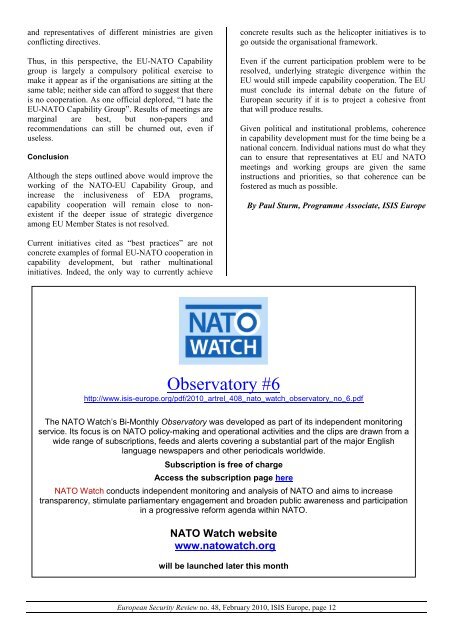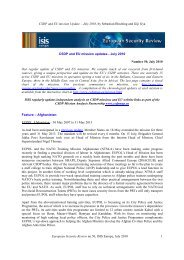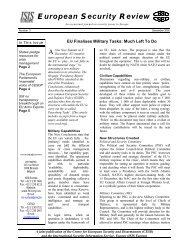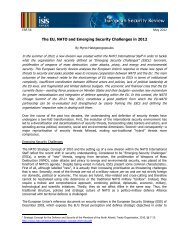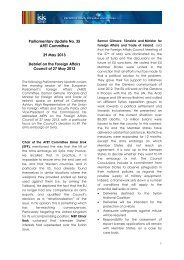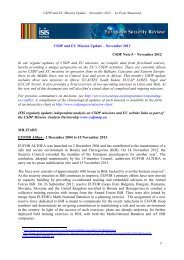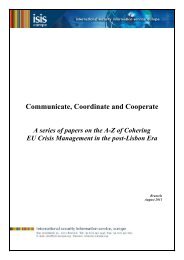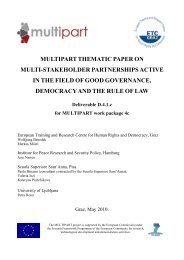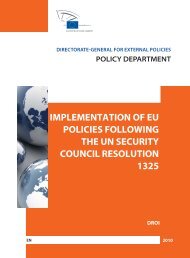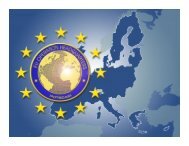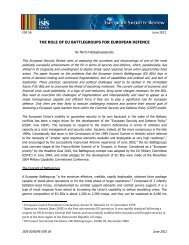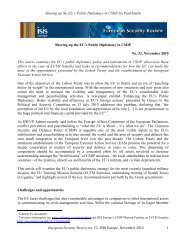ISIS Europe News In This Issue
ISIS Europe News In This Issue
ISIS Europe News In This Issue
You also want an ePaper? Increase the reach of your titles
YUMPU automatically turns print PDFs into web optimized ePapers that Google loves.
and representatives of different ministries are given<br />
conflicting directives.<br />
Thus, in this perspective, the EU-NATO Capability<br />
group is largely a compulsory political exercise to<br />
make it appear as if the organisations are sitting at the<br />
same table; neither side can afford to suggest that there<br />
is no cooperation. As one official deplored, “I hate the<br />
EU-NATO Capability Group”. Results of meetings are<br />
marginal are best, but non-papers and<br />
recommendations can still be churned out, even if<br />
useless.<br />
Conclusion<br />
Although the steps outlined above would improve the<br />
working of the NATO-EU Capability Group, and<br />
increase the inclusiveness of EDA programs,<br />
capability cooperation will remain close to nonexistent<br />
if the deeper issue of strategic divergence<br />
among EU Member States is not resolved.<br />
concrete results such as the helicopter initiatives is to<br />
go outside the organisational framework.<br />
Even if the current participation problem were to be<br />
resolved, underlying strategic divergence within the<br />
EU would still impede capability cooperation. The EU<br />
must conclude its internal debate on the future of<br />
<strong>Europe</strong>an security if it is to project a cohesive front<br />
that will produce results.<br />
Given political and institutional problems, coherence<br />
in capability development must for the time being be a<br />
national concern. <strong>In</strong>dividual nations must do what they<br />
can to ensure that representatives at EU and NATO<br />
meetings and working groups are given the same<br />
instructions and priorities, so that coherence can be<br />
fostered as much as possible.<br />
By Paul Sturm, Programme Associate, <strong>ISIS</strong> <strong>Europe</strong><br />
Current initiatives cited as “best practices” are not<br />
concrete examples of formal EU-NATO cooperation in<br />
capability development, but rather multinational<br />
initiatives. <strong>In</strong>deed, the only way to currently achieve<br />
Observatory #6<br />
http://www.isis-europe.org/pdf/2010_artrel_408_nato_watch_observatory_no_6.pdf<br />
The NATO Watch’s Bi-Monthly Observatory was developed as part of its independent monitoring<br />
service. Its focus is on NATO policy-making and operational activities and the clips are drawn from a<br />
wide range of subscriptions, feeds and alerts covering a substantial part of the major English<br />
language newspapers and other periodicals worldwide.<br />
Subscription is free of charge<br />
Access the subscription page here<br />
NATO Watch conducts independent monitoring and analysis of NATO and aims to increase<br />
transparency, stimulate parliamentary engagement and broaden public awareness and participation<br />
in a progressive reform agenda within NATO.<br />
NATO Watch website<br />
www.natowatch.org<br />
will be launched later this month<br />
<strong>Europe</strong>an Security Review no. 48, February 2010, <strong>ISIS</strong> <strong>Europe</strong>, page 12


